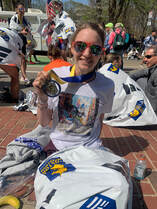Kaitlyn McNamara, PT, DPT, OCS of Empower U Physical Therapy, is working to change that.
As both a performance-focused physical therapist and an endurance coach, Kaitlyn brings a rare combination of clinical expertise and athlete empathy to her practice. She’s not just treating injuries — she’s rebuilding trust between runners and the healthcare system.
A Voice for Runners in the Medical World
Kaitlyn’s passion for helping runners stems from a personal understanding of how frustrating recovery can be. “Runners are often unintentionally mistreated in the medical community,” she explains. “They’re misunderstood, and the advice they receive is often unhelpful.”
After navigating her own share of serious injuries with little support, Kaitlyn saw a need for something better. “I wanted to be the person runners could turn to — someone who understands their goals, their bodies, and what it really takes to return to performance.”
It didn’t take long to realize that traditional rehab often stops short. “There’s a huge gap between returning to running and returning to training. That’s why I became a coach — to help runners close that gap safely and confidently.”
Rewriting the Recovery Rulebook
Kaitlyn’s approach is deeply adaptable, and rooted in the belief that there’s no one-size-fits-all formula for success.
“Two runners can be equally successful in a marathon, with one running 40 miles a week and the other running 80,” she says. “What matters is finding the approach that fits your life, your goals, and your body.”
A major misconception she’s eager to bust? That physical therapists will always tell you to stop running. “We’re not here to take your sport away — we’re here to help you keep doing what you love, with fewer setbacks and more confidence.”
She also emphasizes that strength and injury-prevention work shouldn’t be treated as afterthoughts or reactionary tools. “Mobility and strength work should be proactive — not a ‘once I’m injured’ thing.”
Smart Adjustments, Stronger Runners
For newer runners, Kaitlyn encourages a slow-and-steady mindset. “Tissues adapt slower than your cardiovascular system. Run slow so you can run fast later — and don’t compare your mileage to others.”
For experienced athletes feeling stuck, her prescription is both simple and strategic: short strength sessions, 1–2x a week, with intention. “Even 20 minutes can provide the new stimulus your body needs to break through a plateau.”
And while you’re at it? Eat more — especially carbs. Fueling, she notes, is one of the most overlooked pieces of the performance puzzle.
Holistic Care in Action
Kaitlyn sees the best results when runners are treated as whole people — not just a diagnosis. One of her most common cases? Stress fractures. “Healing them requires a full-circle approach,” she explains. “I loop in sports dietitians, collaborate with coaches, and help the runner focus on what they can do during recovery.”
It’s this kind of personalized, collaborative care that Kaitlyn hopes to bring to every athlete she meets.
Rapid-Fire with Kaitlyn
- Favorite post-run meal: Bagel Boy
- Go-to recovery tool: Dry needling and mobility
- Current favorite running shoes: Saucony Endorphin Elite 2 and Asics GlideRide Max
- Dream race: Run UTMB in Chamonix; spectate the Olympic marathon
- One word to describe her coaching style: Adaptable
🎟️ Don’t Miss It
🗓️ Friday, June 13 | ⏰ 5:30 PM
📍 605 Running Company – Bridges at 57th
Join Kaitlyn and our full panel of local experts for a powerful conversation on how to train smarter, stay healthy, and take a holistic approach to your running.
➡️ This event is FREE, but registration is required! Reserve your spot here:
Source: run605.com

